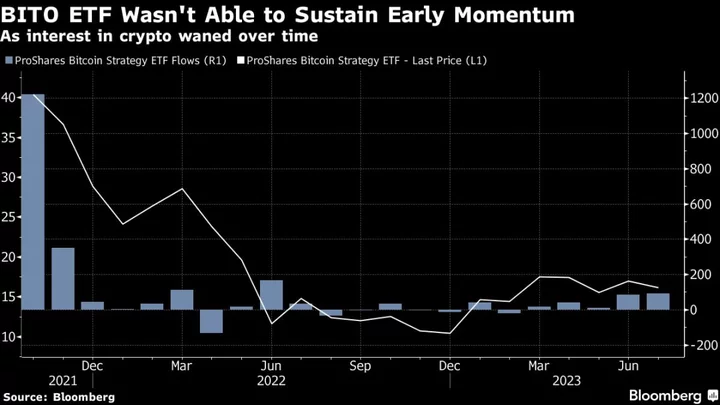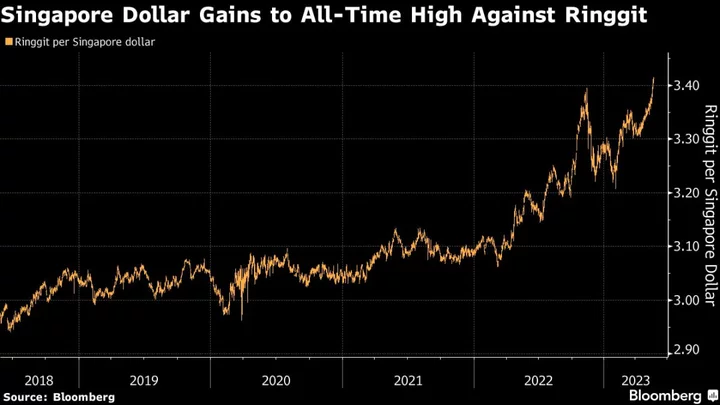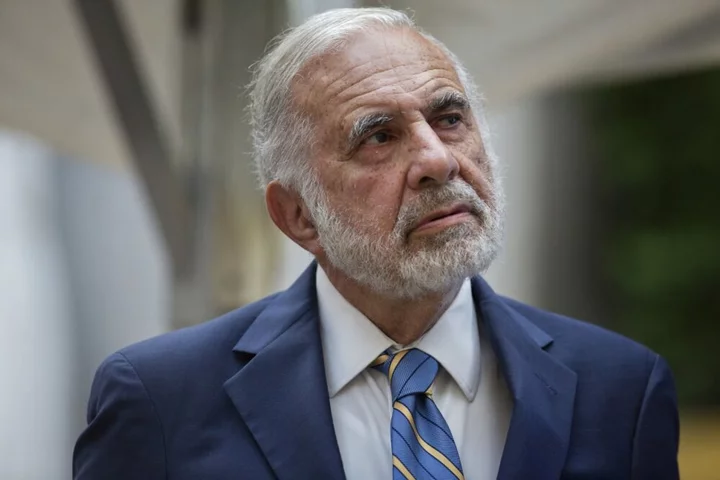The best argument in favor of approving new Bitcoin exchange-traded funds is that they already exist, tracking futures. Sadly for the crypto crowd, that’s also the best argument for why nobody needs a new one.
Proponents say that the arrival of a US spot ETF would open the floodgates to a new wave of investors, potentially ushering in more than $50 billion of demand. A fresh batch of applications led by asset management titan BlackRock Inc. reignited optimism that the Securities and Exchange Commission may finally give its blessing after more than a decade of denials, powering a 20% Bitcoin rally since mid-June.
On the other side, naysayers are skeptical that a US spot fund would be a true game changer. After all, everyone who has wanted access to exchange-traded Bitcoin products that do virtually everything a spot tracker will do has been able to get it, albeit somewhat imperfectly — for more than two years. And for the most part, they haven’t cared.
The debut of the first US Bitcoin futures-backed ETFs happened back in October 2021 — in an eye-catching way. The ProShares Bitcoin Strategy ETF (ticker BITO) experienced roughly $1 billion in turnover right from the get-go. That acted as a catalyst for Bitcoin hitting an all-time high of nearly $69,000 just weeks later.
Yet the early momentum didn’t carry through — the fund never saw the same amount of flows as it did then.
“Look at what we saw on futures front — it was a lot of money that went in Day One, but then — for all intents and purposes — it paused,” Jillian DelSignore, managing director and head of strategic growth and solutions at FLX Networks, said in an interview. “I think we’ll definitely see multiple billions of dollars come in. I do think it will be a very early momentum-driven asset growth, and then the question mark for me is what happens from there. Does it quiet down?”
JPMorgan joined the debate in recent days, arguing that any US spot Bitcoin ETF approval won’t be transformational for the sector because such products have existed in Canada and Europe for years without having seen tremendous inflows. There’s been little investor interest, argues strategist Nikolaos Panigirtzoglou, and existing funds have failed to benefit from outflows out of gold ETFs.
Bloomberg Intelligence draws a different conclusion when looking at Canada and Europe. Demand in the US, where the ETF market is larger and where the vehicles are much more widely used, could end up being stronger.
Crypto exchange-traded products account for around 1% of all Canadian ETF assets; carrying that same logic over to the US would equate to an asset potential of around $54 billion, BI analysts Athanasios Psarofagis and James Seyffart said. For context, roughly $137 billion sits in US commodity ETFs overall.
It’s hard to overstate the amount of hype that’s surrounded the still-hypothetical spot fund. Many crypto fans argue that an approval would not only make it easier to invest in Bitcoin, but would also showcase the crypto industry’s move into the mainstream. BlackRock Chief Executive Officer Larry Fink, a one-time crypto skeptic, recently added his voice to those who see Bitcoin as an agent for diversification.
“It has a differentiating value versus other asset classes, but more importantly, because it’s so international it’s going to transcend any one currency,” Fink said Friday in an interview with CNBC.
Plenty of reasons are posited for why a spot fund could turn out to attract more attention than the futures funds ever did. It would allow financial advisers easier access; it could potentially be cheaper than the futures ETFs; and it wouldn’t have costs associated with it — or limitations on contracts — that are embedded in the futures product.
“In all my years of covering ETFs, I have never seen a prospective product with more hype. There’s a reason for that, and it’s my belief the pre-launch hype will be met with record demand,” said Nate Geraci, president of The ETF Store, an advisory firm. “While futures-based Bitcoin ETFs have done an admirable job of tracking the spot price of Bitcoin, they haven’t been perfect,” he added. BITO, for instance, is down 62% since its inception, versus Bitcoin’s 53% drop.
“Investors want the real deal. They don’t want to hassle with potentially significant tracking error,” Geraci said.
Still, the blowback from 2022’s crypto market drop and series of collapses across the industry — some of which are still unfolding — has cooled a chunk of its investor base to the space. Collectively, retail investors have lost billions to scams and frauds, trading volumes have plummeted and liquidity in the market has dried up.
In other words, the number of people who potentially might be interested in investing in Bitcoin has significantly dwindled since the highs.
“I’m not sure if there is a ton of hype around Bitcoin where an everyday investor who maybe isn’t as engaged in the market is wanting to buy Bitcoin at the moment,” Alex Coffey, TD Ameritrade senior trading strategist, said. “Several years ago, it was surging, it was the talk of the town, so there was a lot more interest.”









